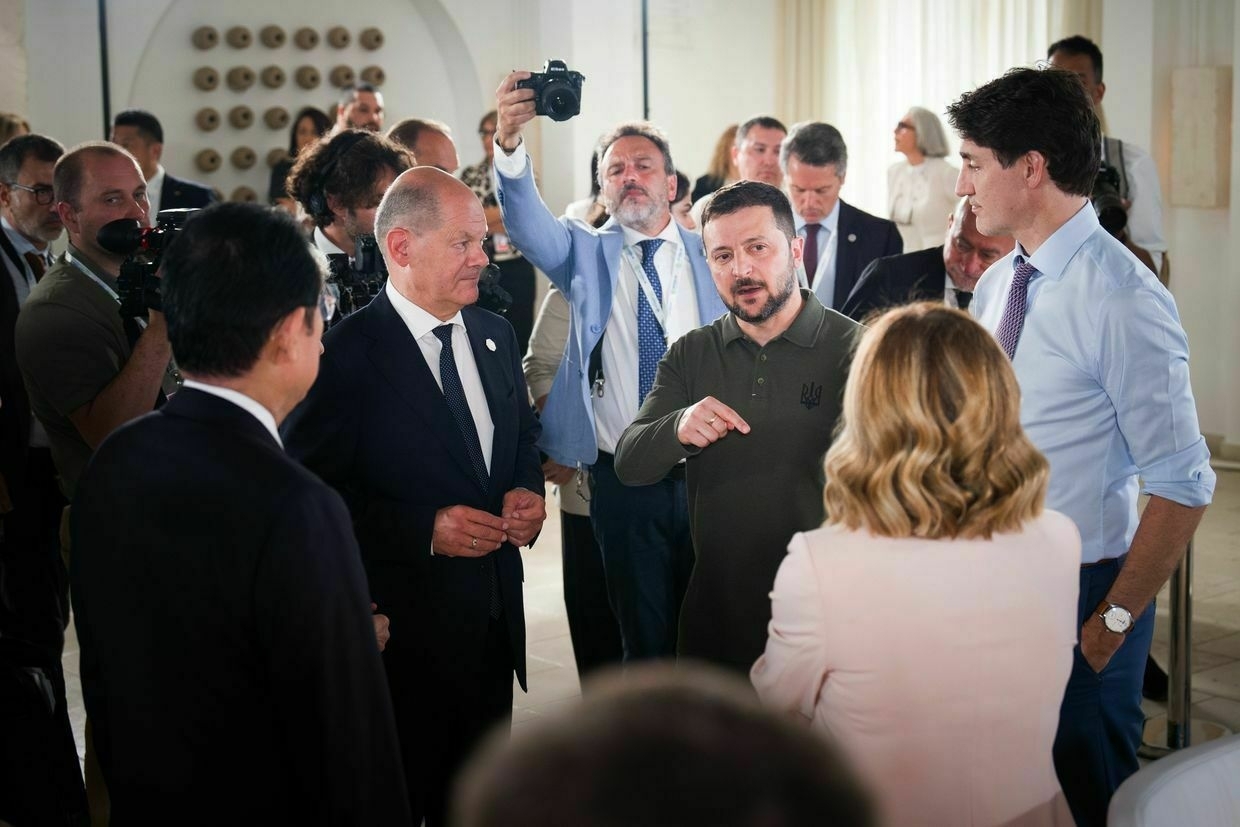
As world leaders prepare to gather in the remote community of Kananaskis in Alberta, Canada for the Group of Seven (G7) Leaders' Summit on June 15-17, Russia’s war in Ukraine once again holds center stage — but views on how to address the three-year conflict diverge sharply.
In the five months since U.S. President Donald Trump’s second term began, the G7’s core principle of unity and collective action has continued to break down amid Washington’s muted response to Russian aggression.
Canada, which holds the G7 presidency in 2025, invited President Volodymyr Zelensky to participate in what will be his fourth — and arguably most fragile — G7 Leaders' Summit since the outbreak of the full-scale invasion in 2022.
As deadly attacks on Ukrainian cities intensify night after night, Zelensky will be tasked with attempting to hold together international support for Kyiv while advocating for more punitive measures against Moscow.
For Zelensky, the summit marks an opportunity to revitalize Western support for sanctions against Russia, impose punitive economic pressures on Russia’s war machine, and potentially rekindle relations with Trump in a pivotal face-to-face meeting.
A high-stakes Zelensky-Trump meeting
Zelensky is expected to meet with Trump on the sidelines of the G7 summit on June 17, marking their third in-person meeting since the American president took office in January. The proposed meeting may serve as an inflection point for Zelensky as pressure mounts on Trump from Western allies.
“Both teams are working to ensure we meet,” Zelensky said on June 14 during a closed-door briefing attended by the Kyiv Independent.
After a disastrous first in-person meeting between the two leaders in the Oval Office in February — during which Trump and Vice President JD Vance lambasted Zelensky over what they described as “a lack of gratitude for U.S. support” — a second meeting in a neutral setting helped smooth over tensions.
After speaking with Trump at the Vatican following the funeral of Pope Francis in early May, Zelensky praised their short, yet "most substantive" conversation.
"With all due respect to our teams, the one-on-one format, in my opinion, worked. We had the right atmosphere for the conversation," Zelensky said after the talk.
Following the Vatican talks, Trump reiterated calls for a Russian ceasefire, even threatening to impose sanctions on Russia — a strikingly different tone than after his initial Oval Office meeting with the Ukrainian president.
In the month since their last in-person meeting, tensions between Trump and Zelensky have risen again. Despite his threats, Trump has not followed through on implementing additional economic pressure on Moscow.
On June 12, Zelensky decried Washington's lack of urgency around sanctions, suggesting that Russia is "lying to Trump." He said that Russian President Vladimir Putin's strategy is to maintain the illusion of dialogue without ever committing to a ceasefire.
 The Kyiv IndependentYuliia Taradiuk
The Kyiv IndependentYuliia Taradiuk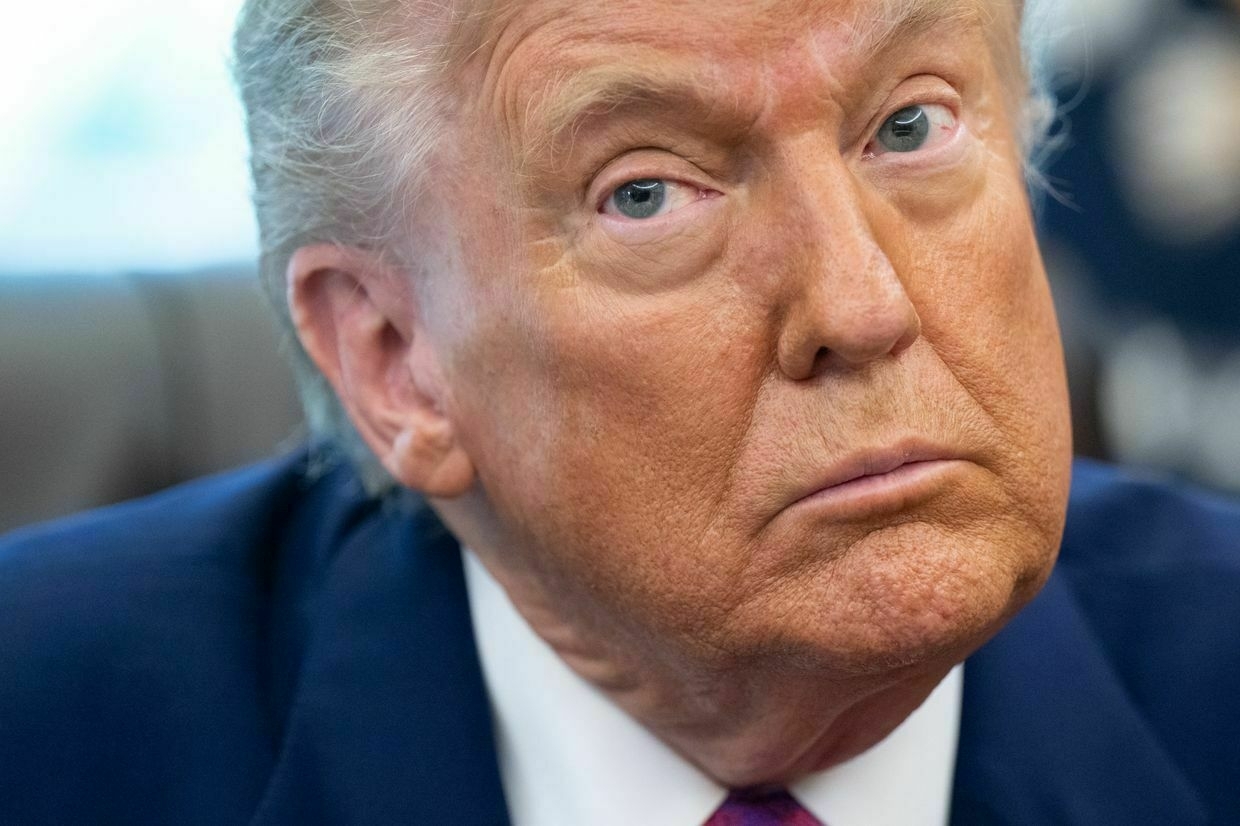
Adding to the anxiety is the Trump administration's lukewarm commitment to military support for Ukraine.
U.S. Defense Secretary Pete Hegseth recently announced that the Pentagon will reduce funding allocated for military assistance to Ukraine in its 2026 defense budget — a decision that Ukrainian lawmakers have warned could have "dire consequences" on the battlefield.
With Trump openly questioning continued U.S. support for Ukraine as well as NATO commitments, his policies have already begun to reshape G7 leaders' strategic calculations — especially when it comes to long-term security guarantees for Kyiv.
"The approach to implementing President Trump's policies is characterized by chaos and uncertainty," political analyst and associate professor at Taras Shevchenko National University Yaroslav Teleshun said.
"But chaos, under certain circumstances, is also a tool that can either accelerate or slow down various processes, or even radically change them. The key question is to what extent Ukraine and members of the club of great powers are ready to work with this and use it to their advantage," Teleshun told the Kyiv Independent.
In the meantime, Trump admitted on social media that he has been sheltering Russian from facing serious consequences as a result of his lack of action — even encouraging Senators to postpone and soften Congress' sanctions bill against Russia.
"What Vladimir Putin doesn't realize is that if it weren't for me, lots of really bad things would have already happened to Russia, and I mean really bad. He's playing with fire," Trump wrote on May 27.
Zelensky's third opportunity at talks comes at a critical crossroads in U.S. support for Ukraine. Another high-stakes meeting with Trump could once again change the tenor of relations between the two leaders — for better or worse.
 The Kyiv IndependentFrancis Farrell
The Kyiv IndependentFrancis Farrell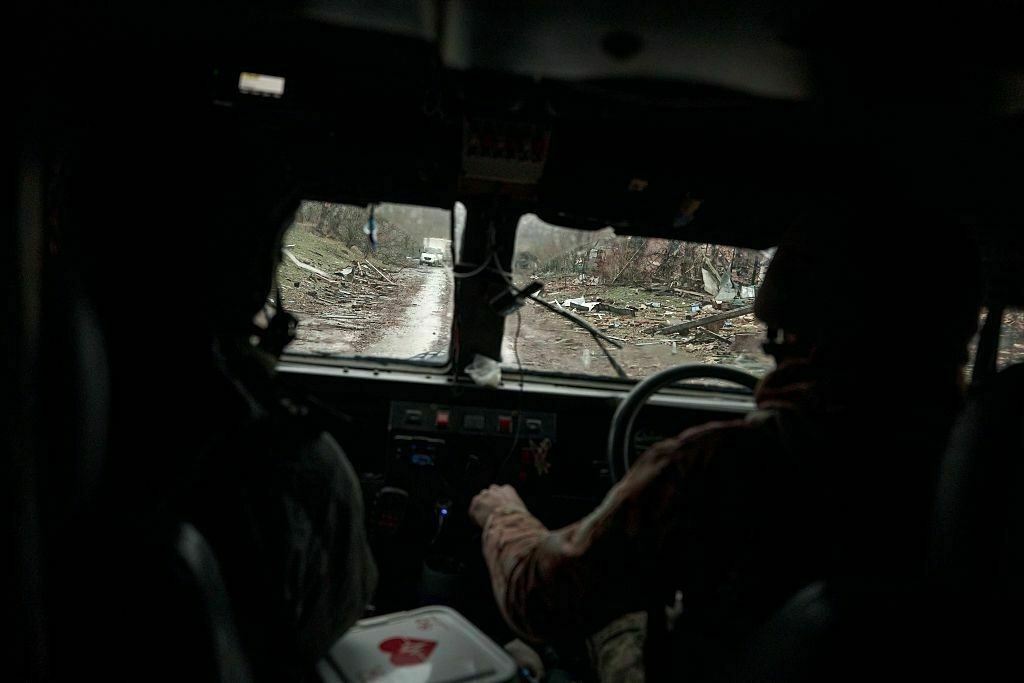
Putting pressure on Russia's war machine
With Trump in power, G7 consensus on the war in Ukraine is collapsing — and with it, the hope of unified economic action against Russia. Zelensky will likely find himself advocating for the type of coordinated response that hasn't been seen since the Biden administration.
While the European Union plans for the implementation of an 18th sanctions package against Russia on energy, banking, and oil, Trump refuses to set a deadline as to when the U.S. can be expected to impose additional sanctions.
Trump has repeatedly threatened to impose sanctions on Russia if he does not see progress in peace talks between Kyiv and Moscow — and repeatedly failed to follow through on these threats.
Despite Russia's rejection of a ceasefire, Trump has said he hasn't imposed new sanctions because he believes a peace deal might be within reach.
"If I think I'm close to getting a deal, I don't want to screw it up by doing that," he said on May 28, adding that he is prepared to act if Moscow stalls further.
While Trump has admitted that Russia may be "tapping me along," he refuses to impose sanctions as it may hinder future business and trade opportunities with Moscow, according to the New York Times.
Trump's comments heavily differ from those of his European allies, who, for the most part, support additional economic pressure on Moscow.
"Russia's goal is not peace," European Commission President Ursula von der Leyen said in pushing for consensus on additional sanction on Russia at the upcoming G7 meeting. "Strength is the only language that Russia will understand."
In addition to sanctions, proposed changes to the oil price cap will also be discussed.
Russia's Finance Ministry has leaned on oil and gas taxes to finance growing military expenditures. The current G7 price cap bans Western companies from shipping, insuring, or otherwise servicing Russian oil sold above $60 per barrel, limiting the country's revenue from oil exports.
The EU has called for the G7 to agree to the reduction of the oil price cap from $60 to $45 per barrel.
For his part, Zelensky called on June 10 for the price cap to be "stronger," proposing to lower it from $60 to $30 per barrel in order to pressure Moscow to declare a ceasefire.
"A ceiling of $45 per barrel of oil is better than $60, that's clear, that's true. But real peace will come with a ceiling of $30," Zelensky said. "That's the level that will really change the mindset in Moscow."
 The Kyiv IndependentWojciech Jakóbik
The Kyiv IndependentWojciech Jakóbik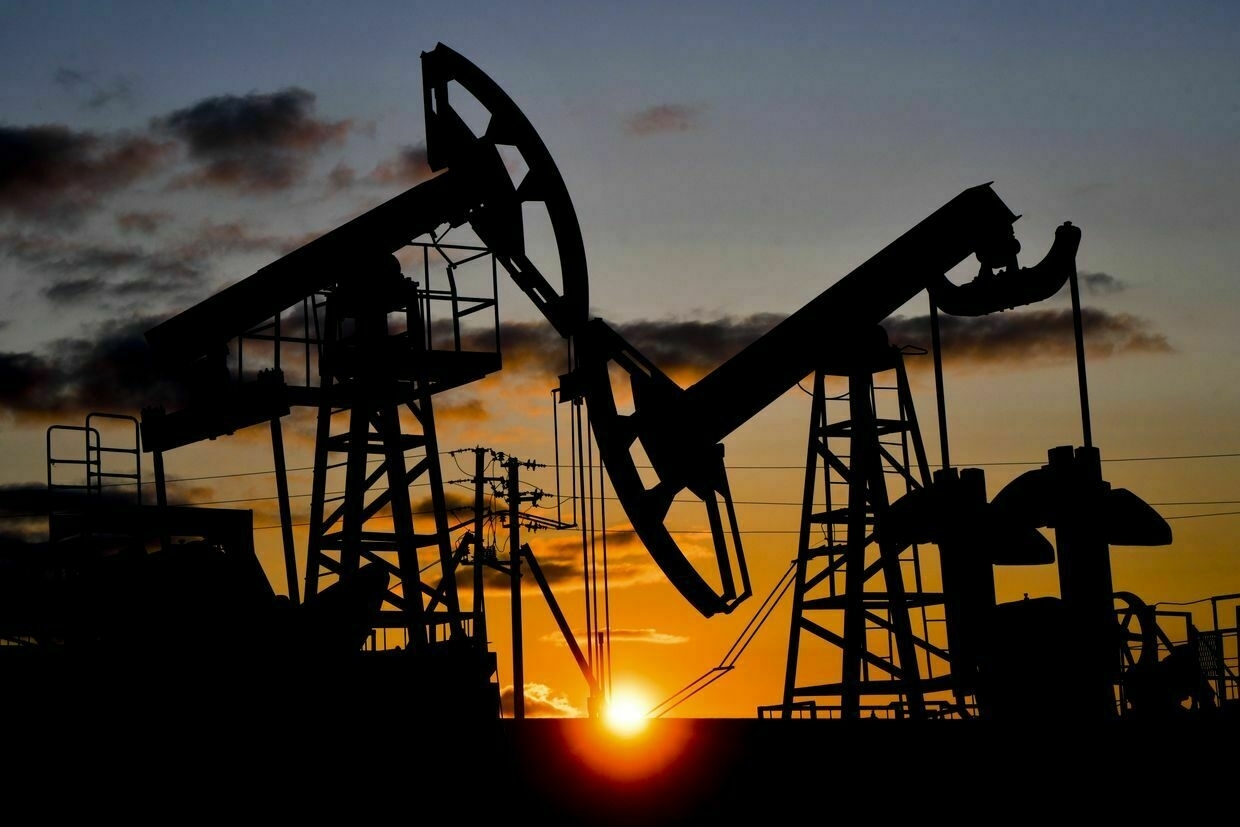
While U.S. officials have not publicly commented on renewed efforts to reduce the price cap, the U.S. opposed a joint G7 effort at the finance ministers meeting in May to lower the cap after U.S. Treasury Secretary Scott Bessent reportedly declined to support it.
In a preview of the potential battle to come over the price cap, Reuters reported on June 12 that G7 nations are prepared to lower the Russian oil price cap from $60 to $45 a barrel even without support from the United States.
The upcoming summit will mark a rare opportunity for Zelensky to advocate for punitive economic measures on Russia in face-to-face meetings with world leaders, encouraging any holdouts to take additional measures.
G7 of disunity?
Unlike the European Union — which legally requires unanimous consent to enact certain measures, such as sanctions — the G7 relies on informal consensus to make an impact on the global economy.
At past G7 summits, joint communiques at the conclusion of meetings have made significant impacts on Russia and Ukraine.
The $60 price cap on Russian oil was jointly introduced by the G7 and EU in December 2022. Similarly, G7 nations finalized a framework agreement for a $50 billion loan for Ukraine backed by frozen Russian assets during the 2024 G7 Leaders' Summit in Italy.
While the G7 has a strong record of progress in supporting Ukraine through economic policy, next week's summit will serve as a major test of resolve for the bloc's collective unity.
Political analyst Teleshun says the G7 Summit is unlikely to be defined by joint declarations, but rather by attempts to navigate a new mode of cooperation among partners. The main goal of the summit, according to him, will be not so much to agree on joint statements as to find possible effective forms of further coexistence between partners.
Ukraine, he adds, will remain a central — and paradoxical — issue: one that both unites and divides. While decisions on future military aid may ultimately be left to individual governments, Kyiv can still use this moment to its advantage. Tightening sanctions against Russia, for instance, could serve as a unifying initiative for G7 countries, but it will require sustained diplomatic effort.
The U.S. objected on May 21 to the inclusion of clauses on "further support" for Ukraine in a joint statement during the precursor meeting of G7 finance ministers. Washington also refused to label Russia's full-scale invasion of Ukraine as "illegal" in the text, according to sources who spoke to Politico.
As Ukraine continues to hold the line against Russia's grinding advances, signs of disunity among Western allies will likely affect Kyiv's ability to fight back against Moscow's forces — and likely embolden Moscow's territorial ambitions.
The G7 summit will once again serve as an indicator for Putin as to what kind of collective response may be expected if he is to pursue additional territorial gains. For Ukraine, the summit will be indicative of the level of unified support it can expect from the U.S. and allies as the war rages into its fourth year.
Olena Goncharova contributed reporting.
 The Kyiv IndependentMartin Fornusek
The Kyiv IndependentMartin Fornusek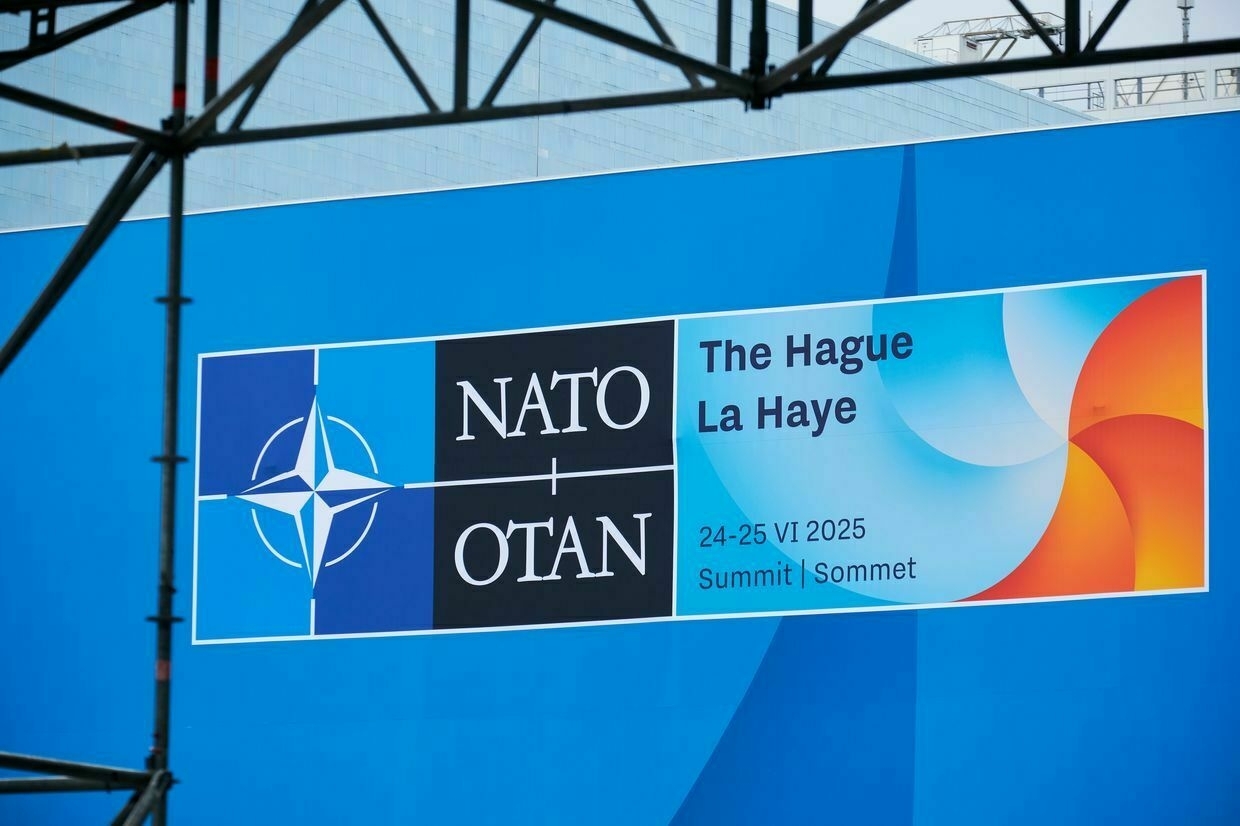
Note from the author:
Hey there, it's Dmytro Basmat, the author of this piece. I'm looking forward to bring you live breaking news coverage from the G7 Leaders' Summit in Canada. My colleagues and I are working around the clock on the ground in Kyiv and overnights in North America to bring you the latest updates on the war in Ukraine. I hope you'll consider supporting us by becoming a paid member of the Kyiv Independent today to help deliver the facts about the war in Ukraine to readers around the world.

